Have you realized dog socialization’s pivotal role in molding your furry companion’s behavior? Dog socialization nurtures your dog into a pet that confidently embraces new experiences. It cultivates a friendly disposition, making your dog adaptable and amicable in various situations.
Furthermore, effective socializing fosters a strong bond between you and your canine companion, making them more approachable around guests and reducing fear-based reactions such as biting or hiding. It benefits your dog and eases your role as an owner, as a well-socialized dog requires less supervision and causes fewer behavioral headaches.
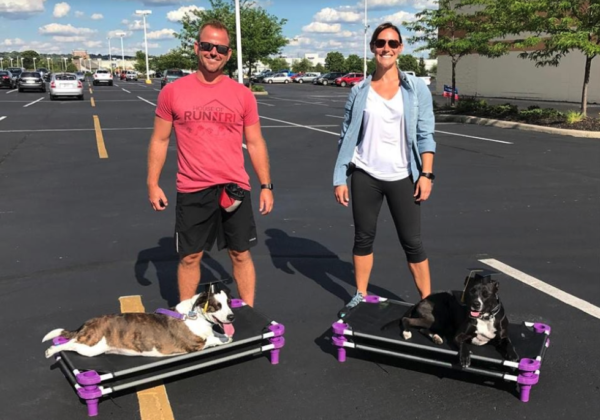
Benefits of Dog Socialization
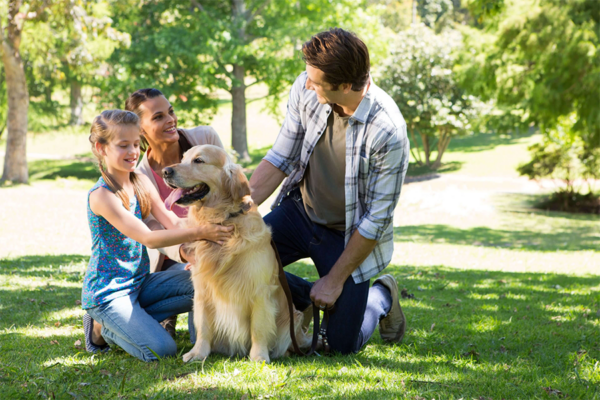
Envision your canine companion fearlessly exploring their surroundings, unburdened by anxiety or aggression. Incredible, isn’t it? That’s the empowering transformation The Dog Wizard’s trainers aim to achieve! Through positive interactions with different environments and experiences, dogs can build confidence and learn to navigate the world easily. They’re able to handle stress better and adapt to changes more quickly. Early life socialization doesn’t just make a dog easier to manage; it significantly enhances their quality of life, paving the way for a happier, more content pet.
Done incorrectly, however, behavior issues can emerge later in life. It can cause an unsocialized dog to react with apprehension and fear of unfamiliar experiences. This, in turn, can make further training far more challenging.
Tips for Successful Puppy Socialization
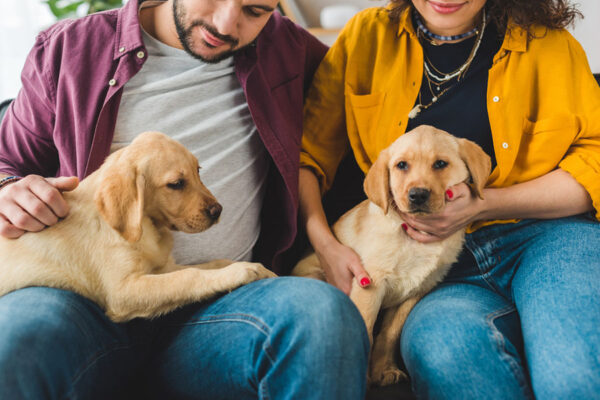
Perfecting the craft of puppy socialization can be challenging, but fear not – The Dog Wizard is here to guide you! Are you ready to learn some pro tips? Begin socializing your puppy as early as possible, ideally between 3 and 12 weeks of age, by introducing them to diverse environments, unfamiliar people, other animals, dog parks, and dog daycare in a controlled manner. Ensure that your puppy training lessons are positive and stress-free. Maintain a calm demeanor and shower your dog with treats for positive interactions. Remember, patience and consistency are extremely important in this process.
Tips for Successful Adult Dog Socialization: Nurturing Confidence in Mature Canines
Even adult dogs can learn new social skills! Successful adult dog socialization requires patience, consistent exposure, and positive reinforcement. Introduce your adult dog to new experiences slowly, starting with calm environments and gradually increasing to more stimulating situations. Always ensure your dog feels safe and comfortable during these introductions. Use positive reinforcement such as treats, praise, or a favorite toy to reward your dog for calm, non-aggressive behavior. Take note of their stress signals and never push them past their comfort zone.
It’s also vital to provide regular opportunities for your dog to interact with others, whether it’s through daily walks, doggy daycare, or organized play dates with other dogs. Over time, this gradual and positive exposure can help improve your dog’s confidence and sociability.
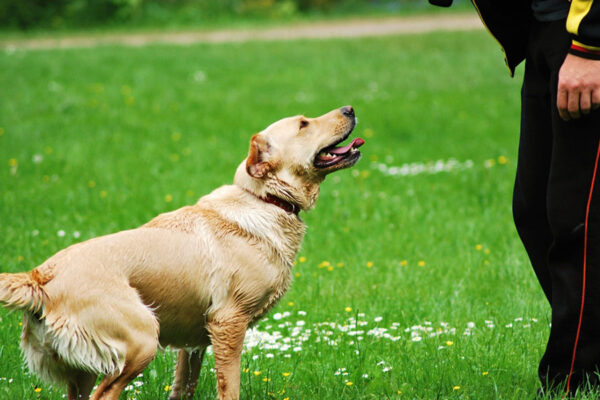
While socialization during the puppy stage is ideal, some dogs may have missed out on this crucial period due to various circumstances. Whether they were ill or adopted at an older age, it’s never too late to help older dogs become more socialized and comfortable in various settings. At The Dog Wizard, we empathize with your unique challenges when socializing an adult dog.
How can your dog overcome ingrained behaviors? We’re here with specialized training programs designed to tackle these very issues. Call (877) 585-9727 today to schedule your first canine socialization training session.
How to Navigate Common Challenges in Dog Socialization
You may face challenges while socializing with your dog despite your best efforts. Fear and aggression are common issues. If your dog exhibits fear, don’t force the situation. Instead, gradually desensitize your pet with controlled exposure to the source of fear. Aggression, often rooted in fear or anxiety, might need professional help. At The Dog Wizard, our seasoned team has the expertise to navigate these challenges, fostering a positive experience for your canine companion.
Canine Socialization for Different Breeds
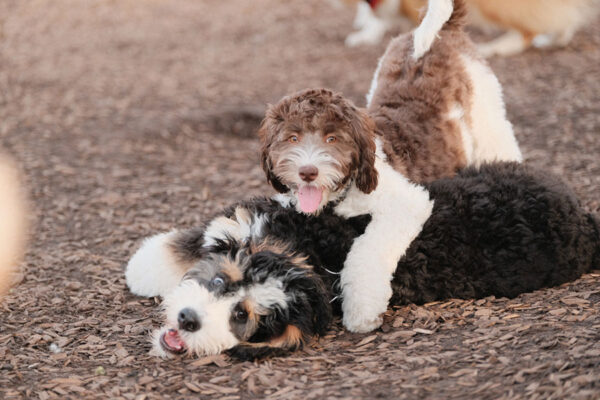
Every dog breed has unique traits, which can aid in the process. Some breeds are naturally more social and outgoing, while others may be more reserved or wary of new experiences. For example, retrievers are often friendly and easy-going, making socializing easier, while breeds like Chihuahuas or Shiba Inus might require more patience and gradual exposure. However, it’s important to remember that while breed traits can influence behavior, every dog is an individual. At The Dog Wizard, we tailor our dog training programs to each dog’s requirements, ensuring a successful socialization period.
The end goal is a dog capable of enjoying being around other dogs, people and its environment, one that’s respectful and controlled whether off-leash or on and taught that not every meeting is a guaranteed social interaction. This makes dog training a lot more straightforward. It’s far easier to teach basic obedience to a calm and relaxed pet that generates those same reactions from animals and people around it.
When Dog Socialization Goes Wrong: Understanding the Consequences
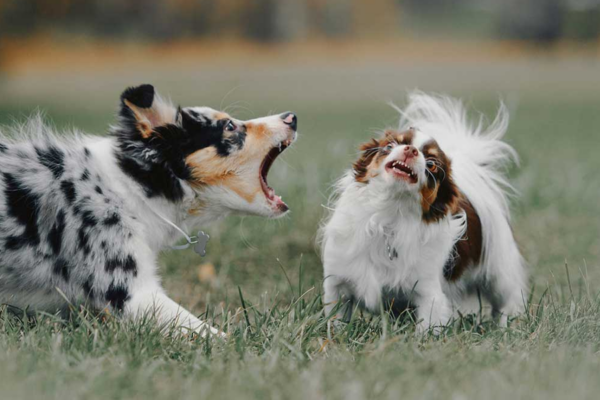
Are you dealing with your dog’s on-leash aggression or nervous reactions to approach? Maybe they’re struggling with excessive barking or fear-based urination. Let’s understand these issues together. Have you wondered why some dogs bark at other dogs or lunge at people when they pass, even if they’re being friendly?
Some typical behavior problems that can also arise from incorrect socializing include:
- On-leash aggression
- Nervousness when approached
- Excessive barking
- Fear-based urination.
These behavioral issues develop when a dog doesn’t make the necessary association, learning instead that everyday occurrences, such as meeting other dogs or seeing a new person, maybe something to be wary of. This may be worsened by further incorrect dog training by well-meaning dog owners, which can embed or strengthen the poor start.
Moreover, the dog may start perceiving ordinary, harmless stimuli as threats, leading to consistent anxiety or fear responses. Such conditions can significantly affect the dog’s mental health, making them more prone to stress and associated health complications. Therefore, appropriate socialization is not just about ensuring good manners; it is essential to your pet’s well-being.
Unlocking The Potential for Dogs of All Ages with The Dog Wizard
Whether it’s a new puppy or an older dog needing training, we cater to dogs of all ages and breeds. Our specialized training programs, including one-on-one private lessons and interactive group classes, are tailored to meet each dog’s unique needs and help them overcome challenges.
Under the guidance of our experienced trainers, we foster an environment conducive to growth, setting them on a path to enjoy fulfilling interactions with other dogs.
Every dog has the potential to master socializing under our guidance, leading to a joyous, confident life filled with enriching interactions. It’s always possible to broaden your dog’s social horizons and improve their overall quality of life.
Embark on this Transformative Journey with The Dog Wizard
We invite you to embark on this transformative journey alongside us. Whether you’re starting with a new puppy or have an older dog seeking proper socialization, our experienced trainers specializing in adult dogs are ready to guide you through every step. Together, we can help your dog thrive, enjoy rewarding social interactions, and experience a truly enriched life.
Take action today and contact The Dog Wizard to schedule an evaluation and discover the range of dog training programs we offer, including dog aggression, dog separation anxiety, obedience training for dogs, and more. Let’s create a positive change in your pet’s life and begin this life-enriching journey together. Call us at (877) 585-9727 to schedule training sessions for your beloved dog.










